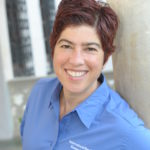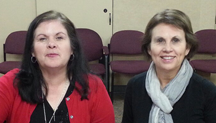

A School District Vision for ELL Education – Podcast Episode 149 | Classnotes Podcast 149
Podcast: Play in new window | Download


Classnotes Podcast (March 6, 2015) In an environment where the pressure on educators is to push English and show results on English-language tests has been an excuse for side-stepping research and best practices, the effect has been dismal academic performance among English language learners. IDRA’s 2015 inaugural IDRA José A. Cárdenas School Finance Fellows Program symposium highlighted research for Texas showing that ELLs are among the lowest academically performing groups of students, particularly in middle school and high school.
In this podcast episode, dual language coordinator Rosalva Silva, however, describes her vision for her school district that ELL children have the opportunity to become bilingual, bicultural and biliterate. With her leadership in the Pharr-San Juan-Alamo school district, Ms. Silva is making sure teachers and administrators understand and use effective strategies for educating ELLs that give students a strong academic foundation in their native language, which catalyzes their learning of English.
Ms. Silva and her sister Rosario Lucero, a retired educator from the Raymondville school district, are interviewed by Laurie Posner, MPA, director of civic engagement at IDRA.
Show length: 15:20
Send comments to podcast@idra.org
Sign up for Classnotes e-mail alerts.
Resources
IDRA José A. Cárdenas School Finance Fellows Program symposium
http://www.idra.org/resource-center/low-funding-for-educating-ells-affects-students-across-texas/
Texas Underfunds ELL Education; Impacts Student Achievement
New Research on Education of English Learners in Middle School & High School Released at IDRA José A. Cárdenas School Finance Fellow Program Symposium
http://createsend.com/t/r-01B17E7624B8B6782540EF23F30FEDED
Framework for Effective Instruction of Secondary English Language Learners
http://www.idra.org/images/stories/Secondary_ELL_Framework_Jan15.pdf
Bilingual Discussion Guide: Bilingual v. ESL – Los programas bilingϋes y de inglés como segundo idioma (Slideshare)
http://www.slideshare.net/IDRAedu/bilingual-ed-and-esl-discussion-guide-in-englishspanish
Education of English Language Learners in U.S. and Texas Schools – Where We Are, What We Have Learned and Where We Need to Go from Here – A 2009 Update
http://www.idra.org/images/stories/IDRA_ELL_Policy_Update_2009.pdf
“Successful Bilingual Education Programs”
by María “Cuca” Robledo Montecel, Ph.D., and Josie Danini Cortez, M.A., IDRA Newsletter
http://www.idra.org/resource-center/successful-bilingual-education-programs-6/
Research Study Results: Good Schools and Classrooms for Children Learning English.
Research by IDRA identified the 25 common characteristics of successful schools that contribute to high academic performance of students learning English.
http://www.idra.org/research_articles/ell-education/good-schools-classrooms-children-learning-english/
Engagement Based Sheltered Instruction
A rich model of student engagement that helps educators understand students’ language proficiency levels and the language demands of content areas, texts and tests; develop student academic language in content areas; and plan, teach and observe for maximum cognitive engagement.
http://www.idra.org/services/engagement-based-sheltered-instruction/
National Clearinghouse for English Language Acquisition & Language Instruction Educational Programs (NCELA)
Analyzes, synthesizes and disseminates information about language instruction educational programs for English language learners and related programs. NCELA is funded by the U.S. Department of Education.
http://www.ncela.us/
Your feedback
We welcome your comments and questions to the podcast. Send an e-mail to podcast@idra.org.
Listen to every episode!
To ensure you don’t miss a single episode of IDRA Classnotes, subscribe to the podcast in iTunes, (download iTunes free if you don’t have it) or sign up to receive an e-mail alert as soon as a new show is published.



